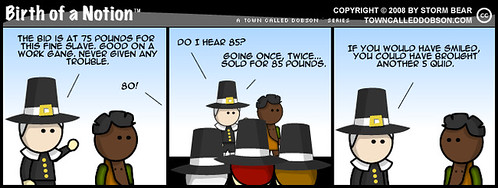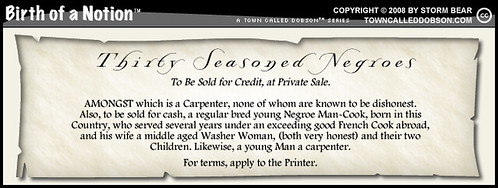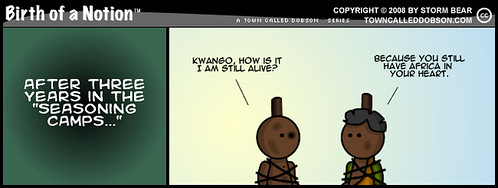 click to enlarge The history of slavery in the United States (1619-1865) began when English colonists first settled Virginia and lasted until the passage of the Thirteenth Amendment to the U.S. Constitution. Before the widespread establishment of chattel slavery, much labor was organized under a system of bonded labor known as indentured servitude. This typically lasted for several years for white and black alike, and it was a means of using labor to pay the costs of transporting people to the colonies. By the 1700's court rulings established the racial basis of the American incarnation of slavery to apply chiefly to Africans and people of African descent, and occasionally to Native Americans. In part because of the Southern colonies' devotion of resources to tobacco culture, which was labor intensive, by the end of the 17th century they had a higher number and proportion of slaves than in the North. From 1654 until 1865, slavery for life was legal within the boundaries of the present United States. Most slaves were black, and were held by whites, however some Native Americans and free blacks also held slaves. The majority of slaveholding was in the southern United States where most slaves were engaged in an efficient machine-like gang system of agriculture. According to the 1860 U.S. census, nearly four million slaves were held in a total population of just over 12 million in the 15 states in which slavery was still legal. Of all 1,515,605 families in the 15 slave states, 393,967 held slaves (roughly one in four), amounting to 8% of all American families. Most households, however, had only a few slaves. The concentration of slaves were held by planters, defined by historians as those who held 20 or more slaves. The planters achieved wealth and social and political power. Ninety-five percent of black people lived in the South, comprising one-third of the population there, as opposed to 2% of the population of the North. The wealth of the United States in the first half of the 19th century was greatly enhanced by the labor of African Americans. But with the Union victory in the Civil War, the slave-labor system was abolished in the South. This led to the decline of the antebellum Southern economy. The large southern cotton plantations became much less profitable due to the loss of the efficiencies in the gang system of agriculture. Northern industry, which had expanded rapidly before and during the war, surged even further ahead of the South's agricultural economy. Industrialists from northeastern states came to dominate many aspects of the nation's life, including social and some aspects of political affairs. The planter class of the South lost power temporarily. The rapid economic development following the Civil War laid the groundwork for the modern U.S. industrial economy. 12 million black Africans were shipped to the Americas from the 16th to the 19th centuries. Of these, an estimated 645,000 (5.4% of the total) were brought to what is now the United States. The overwhelming majority were shipped to Brazil. The slave population in the United States had grown to four million by the 1860 Census. Disclaimer:
|
Friday, April 4, 2008
Black History: Smile When You Are Sold
Posted by
Storm Bear
at
5:34 AM
0
comments
![]()
Labels: america, cartoons, comics, slave auction, slavery, webcomics
Thursday, April 3, 2008
Black History: Thirty Seasoned Negroes
 click to enlarge This is a recreation of an advertisement for the sale of Slaves in the American South. Link Ads such as these were not the exception, they were not rare, they were in every paper and similar posters could be found in almost every capital and port city in the "New World" during this era. This is not "Black Hysteria" or "civil rights nonsense" as some of my recent emails have claimed. This is not Black History - it is American history. You can find more slave ads here, courtesy of the University of Virginia. Cornell University has an excellent online collection of Anti-Slavery documents from the period. Those of you hooked on the HBO mini-series will enjoy this collection as it has a lot of John Adams' rants against slavery included. Disclaimer:
|
Posted by
Storm Bear
at
6:33 AM
0
comments
![]()
Labels: Africa, cartoons, comics, slave auction, slavery, webcomics
Race, Politics, and Music - No James Brown Museum ?
40 Years after the MLK Assassination - 40 years after JB's 'saving Boston." No Way! There must be a James Brown Museum! AAPP: The Auctioning off of James Brown Life Experience is an American Disgrace. Yes, It's an American disgrace. With so many black millionaires, let see if one of the thousands of black American multi millionaires steps up and saves these items from being sold. Is there any doubt America needs a James Brown Museum? This is a Black American disgrace. Read the complete listing of items in the James Brown auction. James Brown brought blacks, whites, reds, yellows, and browns together- through music. UPDATE: Micheal-Davis at Dallas Progress informs us The annual list of congressional pork projects came out today. One of the biggest suspect projects was Charles Rangel's (congressman from Harlem) $2MM research center that he named after himself. Three main quotes of the article: "But the inspiration for Rangel's library and the idea to give it federal funding came from Rangel, not the college, according to Edmondson. " AND According to promotional brochures, the soon-to-be refurbished building will house the new "Charles B. Rangel Center for Public Service," the "Rangel Conference Center," "a well-furnished office for Charles Rangel" and the "Charles Rangel Library" for his papers and memorabilia. It's kind of like a presidential library, but without a president. In fact, the brochure says Rangel's library will be as important as the Clinton and Carter libraries. AND Micheal-Davis at Dallas Progress, says: "I cannot think of anything I am more proud of," said Rangel, D-N.Y. AAPP: Your right Micheal, in fact many of his artifacts should be in Smithsonian! H/T Micheal-Davis at Dallas Progress, for this link: http://tinyurl.com/2ng7lq  James Brown , circa 1968. Hulton Archive/Getty Images There needs to be a national movement to save these items. Where are you Oprah? Where are you Robert Johnson? Where Are you Bill Cosby? Where Are You Eddie Murphy? Where Are You Chris Rock? Where are You Black Athletes? Where are you Usher? It's time to get busy people. on the eve of the 40th year of the loss of Martin Luther King, this cannot be happening. I know exactly what I was doing on April 5, 1968, when soul brother #1 James Brown performed in my home town of Boston. He helped save a city from the kinds of devastating riots that ripped most major cities apart after the assassination of Martin Luther King, Jr. I lived in Boston, I was there 'The Night James Brown Saved Boston." It time to save these important items from being sold to the highest bidders. Watch this blog, lets join together to save these items. I want you to join me. Spread the word! http://aapoliticalpundit.blogspot.com/2008/04/no-james-brown-musuem-no-way-there-will.html AAPP As reported by Chronicle.Augusta.com There is more James Brown auction items selected - Singer's children file objection to belongings list. Court-appointed estate representatives have selected 394 lots to be sold by New York auction house Christie's by Aug. 1, per a judge's order. The list has already drawn objections from the singer's children and his disputed fourth wife, Tomi Rae Hynie Brown, who says some of the items belong to her. In February, Judge Jack Early ordered that the singer's possessions and homes be auctioned off to pay mounting legal bills and overdue estate taxes. Court records show that the singer's estate is in financial trouble, and $1.6 million is needed this year alone just to pay bills. The estate attorneys filed the final list of auction items late last week in Aiken County Court, and a tax appraisal done by Christie's shows that nearly $1.5 million in assets are at the singer's Beech Island home. The appraisal could indicate what the items might sell for at auction. The singer's heirs were asked to submit a list of items they wanted held back, but a letter from estate representatives included with the court filings told the family that they've turned in an "extraordinary" number of requests that "do not comply with the Court's order." Five of the singer's children filed objections to the auction list, and their attorney says in court papers that some items can't be sold as one lot and that some items cannot be found in the home. The Christie's appraisal was attached to their objection. Check out what is being sold.FOR SALE Court-appointed estate representatives filed a 29-page list of James Brown's possessions that could be auctioned off by Aug. 1. They include (appraisal value when available): 1974 Mercedes ($25,000) 1941 Lincoln Continental ($35,000) 1962 Red Thunderbird ($30,000) 78 pairs of shoes and boots ($15,000) Photographs from Mr. Brown's career with celebrities, politicians, family and from his childhood (childhood photo valued at $1,000) 590 "accessories," which include ties, socks, underwear, scarves and gloves ($12,500) |
Posted by
AAPP
at
1:50 AM
0
comments
![]()
Labels: Gender Politics, James Brown, Music, R and B Music, Race, Soul Music
Wednesday, April 2, 2008
Black History: Slave Market of Charleston
 click to enlarge They were born broken. Thus was the economics of slavery and the civilization of the New World was built on slave labor. Seventy percent of the slaves brought to the New World were used to produce sugar, the most labor-intensive crop. The rest were employed harvesting coffee, cotton, and tobacco, and in some cases in mining. The West Indian colonies of the European powers were some of their most important possessions, so they went to extremes to protect and retain them. For example, at the end of the Seven Years' War in 1763, France agreed to cede the vast territory of New France to the victors in exchange for keeping the minute Antillean island of Guadeloupe. Slave trade profits have been the object of many fantasies. Returns for the investors were not absurdly high (around 6% in France in the 18th century), but they were considerably higher than domestic alternatives (in the same century, around 5%). Risks — maritime and commercial — were important for individual voyages. Investors mitigated it by buying small shares of many ships at the same time. In that way, they were able to diversify a large part of the risk away. Between voyages, ship shares could be freely sold and bought. All these made the slave trade a very interesting investment. By far the most successful West Indian colonies in 1800 belonged to the United Kingdom. After entering the sugar colony business late, British naval supremacy and control over key islands such as Jamaica, Trinidad, and Barbados and the territory of British Guiana gave it an important edge over all competitors; while many British did not make gains, some made enormous fortunes, even by upper class standards. This advantage was reinforced when France lost its most important colony, St. Dominigue (western Hispaniola, now Haiti), to a slave revolt in 1791 and supported revolts against its rival Britain, after the 1793 French revolution in the name of liberty (but in fact opportunistic selectivity). Before 1791, British sugar had to be protected to compete against cheaper French sugar. After 1791, the British islands produced the most sugar, and the British people quickly became the largest consumers. West Indian sugar became ubiquitous as an additive to Indian tea. Nevertheless, the profits of the slave trade and of West Indian plantations amounted to less than 5% of the British economy at the time of the Industrial Revolution in the latter half of the 1700s. But to get to from the slave trader to the plantation owner, the slave was auctioned off. One such slave auction center was Charleston, SC, the birth place of the Civil War ironically. From HistoricCharleston.org: Charleston was the major point of entry for Africans brought to America in the eighteenth century. Approximately three out of four enslaved Africans came to America through this port city, which had a black majority by 1790. In 1808, the foreign slave trade was abolished, but American-born slaves continued to be bought and sold until the Civil War. Disclaimer:
|
Posted by
Storm Bear
at
9:18 AM
0
comments
![]()
Labels: cartoons, charleston, comics, plantation economics, seasoning camps, slave auctions, webcomics
Is "Sunday Morning Apartheid" really gone?
Is "Sunday Morning Apartheid" gone? Is In 2006, the National Urban League released a report showing how racially segregated the Sunday morning talk shows are. According to their report, more than 60% of all of the broadcasts of the Sunday morning talk shows had no black guests on them at all. And 80% of the roundtables had no black participants. Now in the NY Times article Felicia Lee notes, The historic and long-running presidential campaigns of Senator Barack ObamaHillary Rodham Clinton have injected issues of race and gender into politics as never before. With campaign coverage center stage on the cable channels, producers and critics are again assessing the diversity among pundits, who talk (and talk) about things like Mr. Obama’s pastor, the Hispanic vote, Iraq and the economy. and Senator In the article Felicia notes, "Both MSNBC and CNN this election season have given new prominence to a handful of contributing commentators from varied backgrounds and perspectives: blacks, Hispanics and women." Felicia's article also points out, "Whether such moves signal real progress in diversifying the punditocracy or merely reflect the needs of a particular news cycle is the question, some media experts say." Here are some other key points in the NY Times article: 1. The most prominent positions on television remain overwhelmingly with those who are white and male, and some critics note how striking that non-inclusion can seem during this election year. 2. Whatever progress has been made with contributors and commentators as of late, the cable networks have a long way to go before they look like the American people,” said Karl Frisch, the spokesman for Media Matters for America, a liberal television watchdog group. He added that white men were the hosts of all the major Sunday morning talk shows, the major prime-time cable news programs and — except for Katie Couric, a relative newcomer — the network evening news broadcasts. 3. Diversity is not just good journalism but also good business, Ms. Ciara and others said.Generally Felicia Lee's article is on point. And you know this African American Political Pundit is in agreement with Tom Rosenstiel, director of the Project for Excellence in Journalism, who points out in the article that cable programs relied more and more on people who can analyze campaign developments, rather than just report them. So television needs more pundits and more kinds of pundits." AAPP: It's great to see and hear, as the article points out, the 2008 lineup at CNN which also includes Alex Castellanos, a Cuban-born Republican strategist, and Leslie Sanchez, a Mexican-American Republican strategist who has also appeared on Fox News. It's also great to see and hear Donna Brazile, journalist and radio host Roland S. Martin; Amy Holmes, a conservative strategist and a former senior speechwriter for Bill Frist, Republican of Tennessee, the former Senate majority leader; and Jamal Simmons, a Democratic strategist, Obama supporter and veteran press spokesman. The other networks are making, let us call it "attempts." As I read the article I wondered when are the Sunday Morning Talk Shows and other Political Talk Shows going to desegregate and include black political bloggers as pundits on these talk shows? Then I had to be honest with myself, the networks are scared to place black political bloggers on the networks. Why? One word "Fear." We all know black political and social commentary bloggers like The Field Negro, Electronic Village, Jack & Jill Politics, Pams House Blend, Prometheus 6, The Super Spade, Black Agenda Report, Eddie Griffin (BASG), Exodus Mentality, Francis L. Holland Blog, Mirror on America, Anderson at Large, Skeptical Brotha this African American Political Pundit and many others would also bring a fresh perspective that America is unaccustomed to hearing in the mainstream media. Network Executives may be fearful that America is so unaccustomed to hearing honest political commentary and analysis that the black bloggers noted above and other black bloggers like Back Yard Beacon, Black Political Thought, AfroNetizen, Black Women In Europe, AfroSpear Think Tank, Black Perspective, Black Smythe, Dallas South Blog, Mrs. Grapevine, Republic of T, What About Our Daughters?, Wichita NAACP Blog, Charcoal Ink, Bygbaby's Mind Spill, A Political Season and yes this African American Political Pundit would be to much for America to handle. Well, Network TV executives and producers who may be reading this post, your wrong. There is no need to fear. By the way, you may want to consider following in the footsteps of the good folks at NPR's News and Notes, Bloggers Roundtable hosted by Farai Chideya. They have been providing bloggers from across America the opportunity to have a conversation with the American people. Farai Chideya and the folks at NPR are accustomed to providing honest political commentary and analysis that the black bloggers bring to America through The Bloggers Roundtable program. OK now getting back to the question, Is "Sunday Morning Apartheid" gone?Answer: Not when the most prominent positions on television remain overwhelmingly with those who are white and male. Not when a critical part of the "new media" is left out of the conversation - black bloggers. It's looking just a tad different on America's airwaves. As far as this African American Political Pundit is concerned, but It could be a lot better. Then again who cares about black faces, for black faces sake. Are the current group of black faces saying what needs to be said? Well, this African American Political Pundit has the hook up. I have my own BlogTalkRadio program and I love being a regular contributor to NPR's Bloggers Roundtable. |
Tuesday, April 1, 2008
Black History: Inside the Seasoning Camps
 click to enlarge Many slaves shipped directly to North America bypassed this process; however most slaves (destined for island or South American plantations) were likely to be put through this ordeal. The slaves were tortured for the purpose of "breaking" them (like the practice of breaking horses) and conditioning them to their new lot in life. Jamaica held one of the most notorious of these camps. Immediately owners and their overseers sought to obliterate the identities of their newly acquired slaves, to break their wills and sever any bonds with the past. They forced Africans to adapt to new working and living conditions, to learn a new language and adopt new customs. They called this process 'seasoning' and it could last two or three years. For Africans, weakened by the trauma of the voyage, the brutality of this process was overwhelming. Many died or committed suicide. Others resisted and were punished. The rest found ways of appearing to conform which still preserved their dignity. Most of the Africans brought into North America prior to 1740 came by way of the West Indies. The most valuable slaves were those born in the Americas--known as Creole slaves, and the least valuable were those directly from Africa. Traders tried to present the enslaved African as being as much like a Creole slave as possible in look and behavior. The process began with the sale itself. Although no standard applied for everywhere in the Americas, the most experienced slavers usually cleaned up the Africans by shaving all the hair from their bodies, washing them with water, and oiling them down with palm oil. The about-to-be-sold slave was also fed often but in small amounts for a few days prior to the sale, trained not to resist having all parts of their bodies examined--especially their reproductive organs, and sometimes allotted a little rum to liven their spirits. In the West Indies, traders might put those slaves destined for the American South into sugar plantation work gangs for a few weeks labor to break them in to the routine. After 1740, when the demand for slave labor was highest, most enslaved people sold into the American South came directly from Africa, and they had to be seasoned by their American owners. Already branded in Africa with the traders mark, they might be branded again with the mark of the new owner. They also would receive new names--usually Christian ones, or names from Classical Rome and Greece--such as Jupiter or Plato, or African-sounding names--like Quack (which was derived from the African word Quaco, meaning a male born on Wednesday) or Squash (which probably came from the word Quashee, meaning a female born on Sunday). Usually older slaves would be put in charge of the seasoning process, teaching the newly purchased enslaved African how to work in gangs, how to conduct themselves, and how to adapt what they knew in Africa to the new environment of slavery. The following is a transcript from a slave named Olaudah Equiano in 1789. This is part of the Hanover Historical Text Project
Disclaimer:
|
Posted by
Storm Bear
at
8:58 AM
0
comments
![]()
Labels: Africa, cartoons, comics, seasoning camps, slavery, webcomics
Monday, March 31, 2008
Some Things I've Had to Accept (Or: Today I Agreed with Peggy Noonan)
Appearing at The Jaundiced Eye, the Independent Bloggers' Alliance, and My Left Wing.  It's a bitter pill, but I have to admit that Nooner has offered some pretty stunning insight into the psyche and motivations of one Hillary Rodham Clinton. I think we've reached a signal point in the campaign. This is the point where, with Hillary Clinton, either you get it or you don't. There's no dodging now. You either understand the problem with her candidacy, or you don't. You either understand who she is, or not. And if you don't, after 16 years of watching Clintonian dramas, you probably never will. So what is it that I am struggling to accept? (Sigh) That the Clintons are a lot more like George W. Bush than I am comfortable considering. Recently, I read a piece by Andrew Sullivan, that felt a little like a blast from the past; the Clinton years, I mean. But, his over-the-top comparison of the Clintons to a horror movie seems less like vicious hyperbole to me now. Well no more than the average lefty rant about Bushco. The Clintons have always had a touch of the zombies about them: unkillable, they move relentlessly forward, propelled by a bloodlust for Republicans or uppity Democrats who dare to question their supremacy. You can't escape; you can't hide; and you can't win. And these days, in the kinetic pace of the YouTube campaign, they are like the new 28 Days Later zombies. They come at you really quickly, like bats out of hell. Or Ohio, anyway. And, I kid you not: So have I. My colleague in blogtopia,* Arthur Gilroy, no doubt counts me among the "kneejerk Hillary bashers," but there was nothing kneejerk about it. My loathing of Hillary took years to develop and was cultivated by one assault on small "d" democracy, and any semblance of good taste, after another. Even her odious vote to authorize war in Iraq was not enough. She was, after all, in the good company of most of the Democrats in Congress. Sure it made me leave the party, but it did not make me single out our Hillary for special contempt. No, that was the death of a thousand cuts. So how did this two-time voter for President Clinton and one time "Hillary for Senate" enthusiast come to find common ground with the "vast right wing conspiracy," in unabashed loathing for this potential first woman President of these United States? As Arthur would say, read on, if you dare. My first inkling that there was something distinctly "wrong" with Hillary, above and beyond the rank and file Dem sell-out, came when I learned of a nasty maneuver in her Senate re-election bid. If you doubt that the US is devolving into an oligarchy where powerful corporations and other moneyed interests control the political process, look no further than New York state. There, an unholy alliance between Hillary Clinton and TimeWarner has seized control of the electoral process by taking away the microphone of her opposition. Yes, it was a stomach-turningly Rovian maneuver; one of Hillary's major donors cutting the mic on her only competition. So, I was less than surprised when she moved to silence other presidential candidates this election season. And today, I find myself unable to gaff off Peggy Noonan's assertion that the Clintons bully the press, in a manner that must surely do the micro-managing press-Nazi Karen Hughes proud. Over the last couple of years, I have written more than a little on Hillary's image-by-committee, her palpable disingenuousness, her bullying; cataloging my growing dislike. But her tactics in what has turned out to be a very competitive primary have pushed me over the edge into vehement disgust. Even more disheartening I am being forced to reassess a former President I quite liked; her husband Bill. I always thought Bill was treated unfairly by the press... and by the vast right wing conspiracy. I stand by that assessment. If I had been forced to endure one more special news report on the President's penis, during his term in office, I probably would have stroked out. A witch hunt it was. But as "the first black President" has lapsed into subtle race-baiting and McCarthyesque insinuations about Obama's patriotism, I have had to consider the possibility that he did a little more than indulge sexual compulsions to earn the extreme ire of some of his detractors. While I have never had any illusions about the wages of triangulation, and other tilts to the right, we endured during the Clinton years, I always gave him props for ameliorating some of the damage that could have been caused by the Gingrich Revolution. (Goodness knows, we have had a good, hard look at how bad free market fundamentalism run amok is for the country, under the current misadministration.) So even if Clinton's domestic policy was somewhere to the right of Nixon, he was to the left of Bush... and that's not nothin.' Bottom line: I found him likable; thought him earnest; considered him, overall, a good President. But his adventures in slime politics during his wife's run, have soured me but good. I've had a glimpse, seen a tiny glimmer, of the man the right wing hated with such passion. Good googly moogly, there really is "a character issue." Whoda thunk it? I can simply no longer consider the Clintons the hapless victims of a cabal of right wing loons. Loons, though they may be, I now understand a bit of the disgust and frustration that arises from witnessing their relentless battle against reality. I must even consider the possibility that Sully is not blowing smoke when he says that the Clintons dragged out the Whitewater investigation by being secretive and evasive. I say this not because I had then or have now the stomach to rifle through the arcane details of a land deal gone awry, but because I've witnessed, in her run for the presidency, the stunning contortions Hillary goes through to avoid acknowledging error and telling simple truths. I've had a little glimpse of the woman behind the curtain, and a bungling, but affable wizard, she is not. Hence, I was not surprised, though I was aghast, at the most recent eruptions of ugliness from the Hillary campaign. I speak of the Sopranosesque threat from her donors to Nancy Pelosi and her blatant lying about her adventures in Bosnia. Yes, Bosnia; a fish tale told by yet another chicken-hawk wannabe whose lack of military cred she tried to parlay into feats of daring do. Can a flight suit and "Mission Accomplished" banner be far behind? And even faced with incontrovertible, videotape evidence, she refuses to shrink that fish back down to its actual size. So, yes, Ms. Noonan, I get it. The Clintons are almost as polarizing as the Bush regime that followed them into the White House. I have now spent seven plus years on the other side of that funhouse mirror. Not for the first time, I've had to address the curious parallel between my rabid disgust for an Administration trafficking in epic distortions of reality and my counterparts on the right side of the aisle, who experienced similar angst during the previous eight. There is far greater symmetry than I ever wanted to admit. As a matter of degree, the Bush years have been far worse. The toll on the economy, the military, the country as a whole, has been far greater than those endured by the worst Clintonian excesses. But, I admit to my chagrin, the Clinton presidency also greased the wheels but good. As I look forward, the thought of enduring still more Bush Republican-lite, is almost as unbearable of the 4 more years of Bush reign a McCain presidency would almost certainly ensure. That politicians lie is not news. That they disappoint is a near certainty. But what we have endured for nearly 16 years borders on the surreal. Not one, but two, administrations fraught with the worst kind of lies and vitriol, volleying back and forth across a political and ideological divide. And as Hillary marshals on, against the blatant reality of delegate math, threatening to upend the will of the voter, if need be, to ensure her ambition, the déjà vu is simply more than I can stand. * Yes, skippy coined the phrase. |
Sunday, March 30, 2008
Fun with captions
Okay, so I'm bored.   Can you think of some good captions for either of those? |









